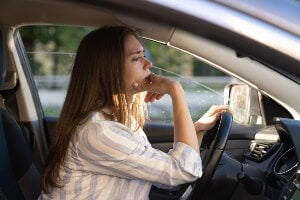 Many people do not think twice about driving with a hangover. Sure, they do not feel the best, but it is not the same as driving while intoxicated, right?
Many people do not think twice about driving with a hangover. Sure, they do not feel the best, but it is not the same as driving while intoxicated, right?
The truth is, even if you are no longer drunk, a hangover can make it much harder to safely operate a vehicle. A hangover can cause a variety of symptoms that mirror the effects of alcohol intoxication.
Galloway Jefcoat discusses why driving while hungover is dangerous, along with legal options for victims of crashes caused by hungover drivers. If you were injured in this type of collision, or any other collision caused by driver negligence, we may be able to assist you with the legal process.
Contact our firm today. There are no upfront costs. Phone: 337-984-8020.
What are the Symptoms of a Hangover?
Most of us do not feel good the morning after consuming a significant amount of alcohol. Many people may feel sick to their stomach and may even vomit. This could be classified as motion sickness, as people may feel sicker if they move around too much. Alcohol consumption also causes dehydration, so people may feel unusually thirsty.
Other symptoms of a hangover may include:
- Headache, as alcohol impedes the flow of blood and oxygen to the brain
- Feeling dizzy, especially when standing up from a seated position
- Struggling to concentrate
- Excessive fatigue
- Your eyes may struggle to adjust to a lot of light
- Increased irritability
- Excessive yawning and drowsiness, as people struggle to get restful sleep after a night of alcohol consumption
- Blurry vision
- Pain in your stomach
- Decreased reaction time, especially when doing things like driving a car
Our Lafayette car accident attorneys are here to help victims of crashes seek compensation. Call to schedule a free legal consultation.
How do Drivers Know if They are Hungover or Legally Drunk?
There may be situations when drivers assume they are hungover but may still be legally drunk. Even if their blood alcohol concentration (BAC) is below the legal limit, it may not be at zero. That means there may still be some level of alcohol impairment.
The important thing to remember is everyone’s body metabolizes alcohol at a different speed, based on various factors like age, gender, body weight and genes. For example, those with more water in their bloodstream tend to process alcohol more quickly. Men tend to have more water in their bloodstream than women, which means a woman’s BAC may remain higher for a longer period.
People who are in poor health because they are overweight or have other chronic physical or mental health problems may have a stronger reaction to alcohol. These individuals may be taking medications that can heighten the effects of alcohol, such as impaired judgment, coordination and motor skills.
Dangers of Driving with a Hangover
The symptoms of a hangover can make it much more difficult to concentrate on driving. People with hangovers may not react as quickly to dangerous situations. They may take longer to notice things, like how close they are getting to the bumper of the car in front of them.
A study done by Utrecht University found people were more likely to drive erratically after consuming 10 alcoholic drinks the night before, even though their BAC had dropped back to zero. Researchers said the effects of a hangover are like the effects of having a BAC between 0.05 and 0.08.
There was a similar study done at the University of West England in which participants drove on a closed course for 20 minutes. The participants did not react as quickly to things as they otherwise might have. They also violated traffic laws in various ways, such as by running through red lights.
Can Louisiana Drivers be Penalized for Driving While Hangover?
Hungover drivers whose BAC is below the legal limit are not going to face penalties for drunk driving. However, if they cause a crash, they may be liable for the injuries and damages that result. They may also be cited for any traffic violations they committed.
What to do After a Crash Caused by a Hungover Driver
Evidence of a hangover may help bolster a crash victim’s liability claim against the at-fault driver. For example, the driver may have caused the crash because he or she was distracted. After the crash, you may get out of your car to exchange information with the other driver and he or she may make an offhand comment about being hungover. Make sure to mention this to the police when they arrive at the scene.
Take note of other signs of a hangover, like the other driver complaining about a headache or excessive yawning. This may indicate a hangover, lack of sleep or both.
Our experienced lawyers may be able to help you seek compensation for your injuries and damages, and there are no upfront costs associated with our services.
Call Galloway Jefcoat After a Crash Caused by an Impaired Driver
You may be more likely to encounter impaired drivers at night or during certain times of the year, such as the holiday season, or Memorial Day or Fourth of July weekend. However, you can encounter impaired drivers at any time.
If you or your loved one were injured in a crash caused by an impaired driver, talking to an experienced lawyer can be an important step. Galloway Jefcoat helps hold negligent drivers accountable by securing compensation for the injuries and damages they cause.
There are no upfront costs with our services and the initial consultation is free.
Call Galloway Jefcoat: 337-984-8020.